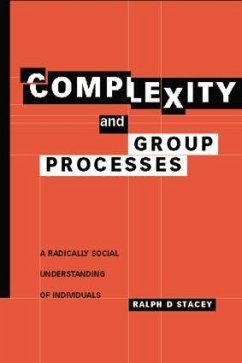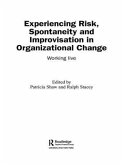- Broschiertes Buch
- Merkliste
- Auf die Merkliste
- Bewerten Bewerten
- Teilen
- Produkt teilen
- Produkterinnerung
- Produkterinnerung
This book suggests an alternative way of understanding human relating. Highly relevant not only for therapeutic groups but also those who are managing, leading and working in organizations.
Andere Kunden interessierten sich auch für
![Experiencing Spontaneity, Risk & Improvisation in Organizational Life Experiencing Spontaneity, Risk & Improvisation in Organizational Life]() Patricia Shaw / Ralph Stacey (eds.)Experiencing Spontaneity, Risk & Improvisation in Organizational Life67,99 €
Patricia Shaw / Ralph Stacey (eds.)Experiencing Spontaneity, Risk & Improvisation in Organizational Life67,99 €![Complexity and Innovation in Organizations Complexity and Innovation in Organizations]() Jose FonsecaComplexity and Innovation in Organizations76,99 €
Jose FonsecaComplexity and Innovation in Organizations76,99 €![Complex Responsive Processes in Organizations Complex Responsive Processes in Organizations]() Ralph Stacey (UK University of Hertfordshire)Complex Responsive Processes in Organizations70,99 €
Ralph Stacey (UK University of Hertfordshire)Complex Responsive Processes in Organizations70,99 €![Tools and Techniques of Leadership and Management Tools and Techniques of Leadership and Management]() Ralph StaceyTools and Techniques of Leadership and Management55,99 €
Ralph StaceyTools and Techniques of Leadership and Management55,99 €![The Complexity of Consultancy The Complexity of Consultancy]() The Complexity of Consultancy55,99 €
The Complexity of Consultancy55,99 €![Complexity Complexity]() Chris MowlesComplexity37,99 €
Chris MowlesComplexity37,99 €![Complexity in Organizations Complexity in Organizations]() Stig O. JohannessenComplexity in Organizations26,99 €
Stig O. JohannessenComplexity in Organizations26,99 €-
-
-
This book suggests an alternative way of understanding human relating. Highly relevant not only for therapeutic groups but also those who are managing, leading and working in organizations.
Produktdetails
- Produktdetails
- Verlag: Taylor & Francis Ltd
- Seitenzahl: 368
- Erscheinungstermin: 21. März 2014
- Englisch
- Abmessung: 224mm x 157mm x 22mm
- Gewicht: 566g
- ISBN-13: 9781138011977
- ISBN-10: 1138011975
- Artikelnr.: 39711496
- Herstellerkennzeichnung
- Libri GmbH
- Europaallee 1
- 36244 Bad Hersfeld
- gpsr@libri.de
- Verlag: Taylor & Francis Ltd
- Seitenzahl: 368
- Erscheinungstermin: 21. März 2014
- Englisch
- Abmessung: 224mm x 157mm x 22mm
- Gewicht: 566g
- ISBN-13: 9781138011977
- ISBN-10: 1138011975
- Artikelnr.: 39711496
- Herstellerkennzeichnung
- Libri GmbH
- Europaallee 1
- 36244 Bad Hersfeld
- gpsr@libri.de
Ralph Stacey is a member of the Institute of Group Analysis in London and works as a group therapist in the NHS. He is also Professor of Management and Director of the Complexity and Management Centre at the Business School of the University of Hertfordshire. He is co-editor of the Routledge series Complexity Emergence in Organizations and author of Complex Responsive Processes in Organizations: Learning and Knowledge Creation.
Part I:Social Selves and Group Processes: Taking the Perspective of Complex
Responsive Processes. The Social Evolution of the Person. Complexity and
Group Processes. The Fundamental Importance of Communicative Interaction.
The Emergence of Self in the Conversation of Gestures. The Physiological
Basis of Mind, Self and Society. The Importance of Belonging: Vicissitudes
of Attachment and Separation. Some Clinical Implications of a Theory of
Complex Responsive Processes. Part II:Internal Worlds and Social Systems:
Defining the Difference Between the Perspective of Complex Responsive
Processes and Psychoanalysis. Freud on the Individual and the Group. The
Movement of Western Thought: Pointing to the Antecedents of Complex
Responsive Processes and Psychoanalytic Perspectives. Locating Freud's
Thought and its Later Developments in the Tradition of Western Thought. The
Development of Relational and Intersubjective Psychoanalysis. The
Incorporation of Systems Thinking into Psychoanalysis. Evolutionary
Psychology. Part III:Dealing with Paradox in Thought: From Eliminating to
Living with Paradox. Foulkes' Dualistic Understanding of the Relationship
Between the Individual and the Social: The Elimination of Paradox. Part IV:
Complex Responsive Processes: The Movement of Paradox and the
Transformation of Identity.
Responsive Processes. The Social Evolution of the Person. Complexity and
Group Processes. The Fundamental Importance of Communicative Interaction.
The Emergence of Self in the Conversation of Gestures. The Physiological
Basis of Mind, Self and Society. The Importance of Belonging: Vicissitudes
of Attachment and Separation. Some Clinical Implications of a Theory of
Complex Responsive Processes. Part II:Internal Worlds and Social Systems:
Defining the Difference Between the Perspective of Complex Responsive
Processes and Psychoanalysis. Freud on the Individual and the Group. The
Movement of Western Thought: Pointing to the Antecedents of Complex
Responsive Processes and Psychoanalytic Perspectives. Locating Freud's
Thought and its Later Developments in the Tradition of Western Thought. The
Development of Relational and Intersubjective Psychoanalysis. The
Incorporation of Systems Thinking into Psychoanalysis. Evolutionary
Psychology. Part III:Dealing with Paradox in Thought: From Eliminating to
Living with Paradox. Foulkes' Dualistic Understanding of the Relationship
Between the Individual and the Social: The Elimination of Paradox. Part IV:
Complex Responsive Processes: The Movement of Paradox and the
Transformation of Identity.
Part I:Social Selves and Group Processes: Taking the Perspective of Complex
Responsive Processes. The Social Evolution of the Person. Complexity and
Group Processes. The Fundamental Importance of Communicative Interaction.
The Emergence of Self in the Conversation of Gestures. The Physiological
Basis of Mind, Self and Society. The Importance of Belonging: Vicissitudes
of Attachment and Separation. Some Clinical Implications of a Theory of
Complex Responsive Processes. Part II:Internal Worlds and Social Systems:
Defining the Difference Between the Perspective of Complex Responsive
Processes and Psychoanalysis. Freud on the Individual and the Group. The
Movement of Western Thought: Pointing to the Antecedents of Complex
Responsive Processes and Psychoanalytic Perspectives. Locating Freud's
Thought and its Later Developments in the Tradition of Western Thought. The
Development of Relational and Intersubjective Psychoanalysis. The
Incorporation of Systems Thinking into Psychoanalysis. Evolutionary
Psychology. Part III:Dealing with Paradox in Thought: From Eliminating to
Living with Paradox. Foulkes' Dualistic Understanding of the Relationship
Between the Individual and the Social: The Elimination of Paradox. Part IV:
Complex Responsive Processes: The Movement of Paradox and the
Transformation of Identity.
Responsive Processes. The Social Evolution of the Person. Complexity and
Group Processes. The Fundamental Importance of Communicative Interaction.
The Emergence of Self in the Conversation of Gestures. The Physiological
Basis of Mind, Self and Society. The Importance of Belonging: Vicissitudes
of Attachment and Separation. Some Clinical Implications of a Theory of
Complex Responsive Processes. Part II:Internal Worlds and Social Systems:
Defining the Difference Between the Perspective of Complex Responsive
Processes and Psychoanalysis. Freud on the Individual and the Group. The
Movement of Western Thought: Pointing to the Antecedents of Complex
Responsive Processes and Psychoanalytic Perspectives. Locating Freud's
Thought and its Later Developments in the Tradition of Western Thought. The
Development of Relational and Intersubjective Psychoanalysis. The
Incorporation of Systems Thinking into Psychoanalysis. Evolutionary
Psychology. Part III:Dealing with Paradox in Thought: From Eliminating to
Living with Paradox. Foulkes' Dualistic Understanding of the Relationship
Between the Individual and the Social: The Elimination of Paradox. Part IV:
Complex Responsive Processes: The Movement of Paradox and the
Transformation of Identity.








